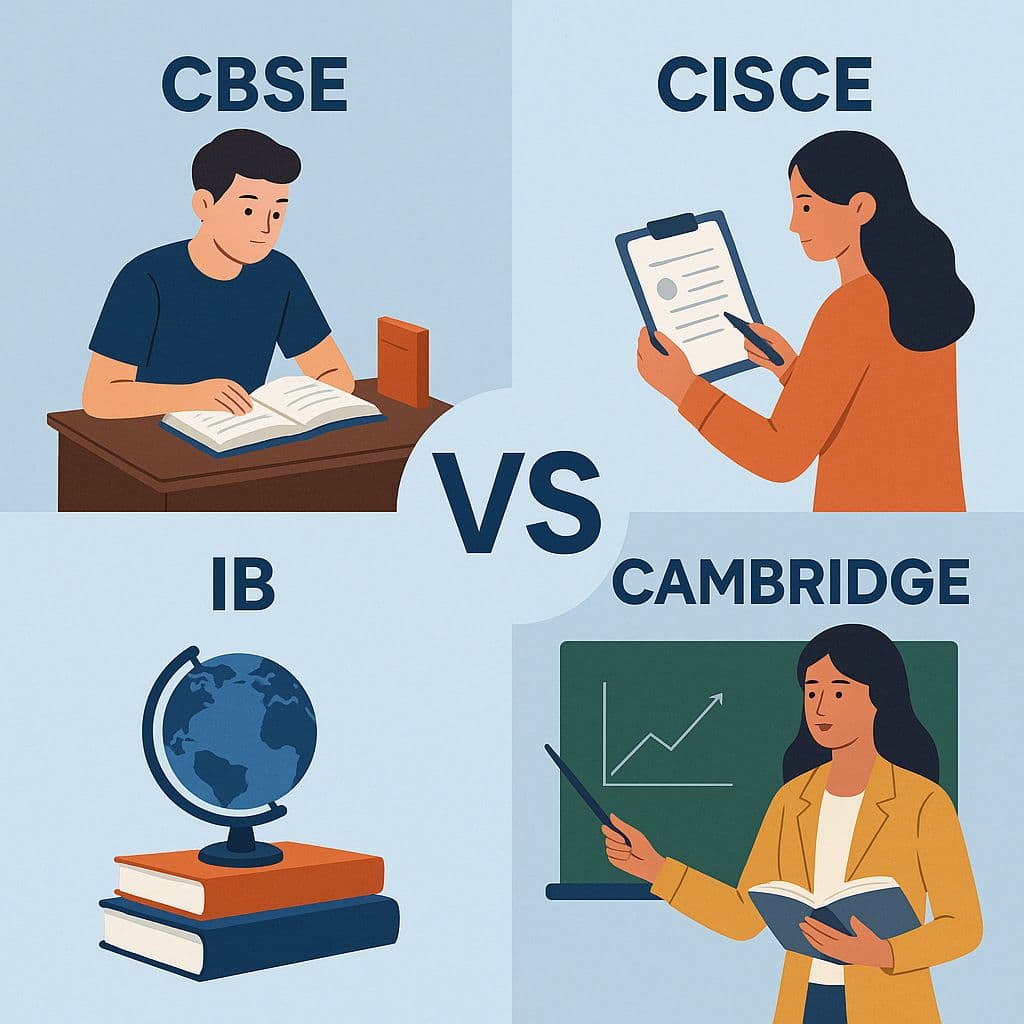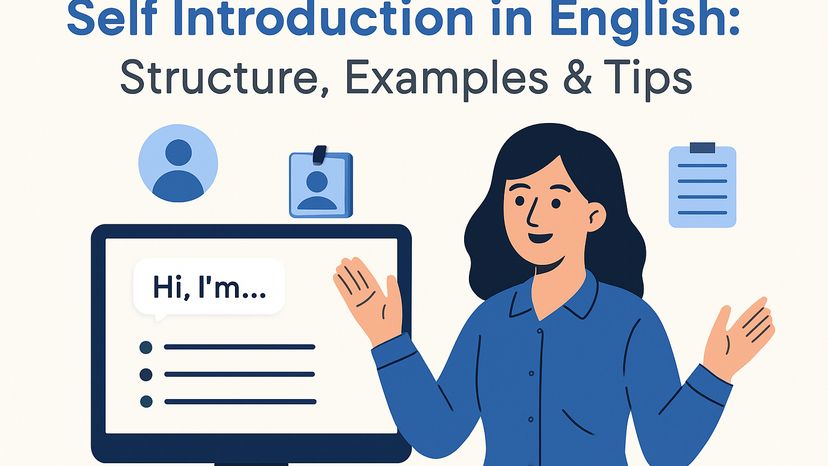In an increasingly interconnected world, building a global mindset is now a necessity, rather than an option. As education continues to develop, we have moved beyond the conversation of selecting a school or subject stream. We are now making choices based on which educational board will best position your child to succeed in this fast moving educational environment.
With different education board in India- CBSE, CISCE, IB and Cambridge, it can be difficult to make sense of the boards to make an informed decision. However, with insights, you can receive clarity and choose the most appropriate education board in india that aligns with your child's passion.
Understanding the IB Board
At the heart of global education is the International Baccalaureate (IB). Based in Geneva, Switzerland, and operated by an elected Board of Governors, IB is designed to foster curiosity, critical thinking, and intercultural understanding from ages 3 to 19.
Key attributes of the IB Board:
- Student-centric learning tailored for ages 3–19
- Holistic development through inquiry-based approaches
- Future-ready skills that build resilience and real-world competence
The IB offers four distinctive programs:
- The Primary Years Programme (PYP): Aged 3 - 12 learners are actively engaged in their learning, stimulating their natural curiosity.
- The Middle Years Programme (MYP): Aged 11 - 16; students make meaningful relationships between their learning and the real world.
- The Diploma Programme (DP): Aged 16 - 19; students are challenged academically through research, critical thinking and communication.
- The Career-related Programme (CP): Aged 16 - 19; students connect their academic studies to career-related pathways.
IB is the right choice for those who value inquiry-led, globally-focused education and aspire to be flexible, future citizens who contribute to our global community.
Exploring the CBSE Board
The Central Board of Secondary Education (CBSE) is India's most recognized educational board, founded in 1929. It governs a vast network of schools across India and abroad, ensuring a standardized and pragmatic learning experience.
Noteworthy features of CBSE:
- NCERT curriculum promoting nationwide consistency
- Strong focus on Science and Mathematics, aligned with competitive exams like NEET and JEE
- Stress-free and holistic education philosophy
- Innovative teacher-student engagement models
- Continuous curriculum enhancement to reflect evolving academic needs
CBSE’s straightforward structure and exam-oriented approach make it a natural choice for families preparing for India's competitive landscape.
A Closer Look at the CISCE Board
The Council for the Indian School Certificate Examinations (CISCE) oversees the ICSE (Class 10) and ISC (Class 12) examinations. A private, well-respected board, CISCE fosters a well-rounded and intellectually rich academic experience.
Key highlights:
- Superior English language development
- Diverse subject offerings across Humanities, Sciences, and Commerce
- Dynamic curriculum that encourages creativity and critical thinking
- Holistic skill-building through Socially Useful Productive Work (SUPW)
Program breakdown:
- ICSE (Class 10): Comprehensive foundation with emphasis on analysis.
- ISC (Class 12): Specialization leading to higher academic pursuits.
- CVE (Vocational): Career-oriented programs for skill development.
CISCE students are widely recognized for their proficiency in English and interdisciplinary competence, making them versatile in global contexts.
Introducing the Cambridge Board
Cambridge Assessment International Education (CAIE) — often referred to simply as Cambridge — is synonymous with global academic excellence. It offers qualifications that are highly respected by universities and employers worldwide.
Core programs include:
- Cambridge IGCSE: Culminating in Grade 10; promotes critical subject knowledge.
- Cambridge A Levels: After Grade 12; a globally acknowledged passport to higher education.
Key differentiators:
- Wide subject flexibility with 70+ options
- Strong emphasis on analytical thinking, problem-solving, and real-world skills
- Culturally neutral frameworks ensuring global relevance
Cambridge offers a balanced blend of academic rigor and personal development, creating well-rounded individuals ready for international opportunities.
Comparative Analysis: CBSE vs CISCE vs IB vs Cambridge
When it comes to comparing CBSE, CISCE, IB, and Cambridge, each board brings distinct advantages to the table. Let’s explore the key differences through detailed points and professional insights:
Number of Schools
- CBSE – With over 27,000 schools globally - CBSE has a wide reach, it is easy to access, and very well known.
- CISCE – There are around 2,750 CISCE schools, mainly in India, offering a smaller academic community which is more niche and targeted.
- IB – There are over 230 IB World Schools in India for families wanting a curriculum with an international reputation.
- Cambridge - Cambridge is found in over 650 schools in India, with strong global connections and credentials.
Focus and Educational Approach
- CBSE: CBSE is linear and exam-focused as a system, prioritizes numeracy and scientific thinking skills valuable for all national markers of excellence and national competitive exams.
- CISCE: CISCE is more balanced, focusing on driving excellence while encouraging creative thinking. The CISCE is also strong in language, arts, and science education.
- IB: IB focuses on holistic development through inquiry-based, interdisciplinary learning. IB focuses on critical thought, communication skills, and intercultural understanding.
- Cambridge: Cambridge is characterized by analytical skills, flexibility of learning and an active international perspective, leaving students well-positioned to adapt to varied contexts around the world.
Subjects Offered
- CBSE: Offers accepted traditional streams - Science; Commerce; and Humanities - each with predetermined subject combinations catering to a broad majority of students.
- CISCE: Offers the same streams as CBSE but allows greater breadth - allowing depth, breadth and cross-discipline exploration which includes socially useful and productive work (SUPW).
- IB: Students study subjects from six major groups while completing three core components: Creativity, Activity, Service (CAS); Theory of Knowledge (TOK); and the Extended Essay (EE).
- Cambridge: Offers truly astonishing breadth (over 70 subjects!) allowing students to create truly personalized academic pathways.
Assessment Criteria
- CBSE: Prioritizes conceptual understanding and memory recall, making the evaluation process more straightforward.
- CISCE: Leans toward evaluating higher-level thinking, deeper subject comprehension, and strong command over English.
- IB: Emphasizes continuous assessments through projects, internal evaluations, essays, and presentations, ensuring consistent academic engagement.
- Cambridge: Balances written exams with oral tests, research-based assignments, and analytical exercises to encourage comprehensive understanding.
Complexity Level
- CBSE: Exam-oriented and considered moderate in complexity, the Board has made it slightly easier for students to do well.
- CISCE: Higher academic rigor than CBSE and requires greater depth, breadth of study, and application.
- IB: Very rigorous, higher academic standards that also emphasize critical research, analysis, and considerations for assessments at various times over two years.
- Cambridge: Academically rigorous, challenges students to demonstrate deep understanding of the subject, independent thought, application of knowledge, and problem-solving within predetermined contexts and guidelines.
Textbooks and Learning Resources
- CBSE: Utilizes required textbooks as indicated by NCERT, and insists on uniformity and standardization across a cadre of schools.
- CISCE: Utilizes pre-chooses textbooks, but also prescribes that books are never improved to allow innovative, curriculum enrichment when established disciplines are dynamic and evolving in their field.
- IB: This should recommend the student use sources, rather than force a textbook or source, to allow independent research and allow the student from various perspectives
- Cambridge: Using essential readings, but allows for the selection of resources on the recommended reading and well suited to a personalized pedagogy of self-managed paced learning approach.
How to Choose the Best Board for Your Child
- CBSE : Perfect for students focussed on Indian competitive exams (NEET, JEE) and cheap, accessible and well organized.
- CISCE : Good fit for students wanting balance among subjects with an emphasis on English and critical thinking skills.
- IB : Best option for students planning on applying to international universities with a focus on leadership, research and intercultural skills.
- Cambridge : Best choice for students looking for flexible subject options, international recognition and strong analytical learning.
Remember: There is no one-size-fits-all answer. The right choice depends on your child's learning style, long-term goals, and personal interests.
Ultimately, no matter the board, a supportive ecosystem, inspiring educators, and active parental involvement are critical to your child's success.
FAQs
Are CBSE examinations simple or complicated?
The CBSE examinations are generally perceived as simpler when content is examined only. For material depth, CBSE focuses on good comprehension of concepts pertaining to a particular subject, instead of just the level of complexity. Ultimately, one's performance reflects the preparation put forth prior to actually sitting for the exam.
What is the full form of CISCE and IB?
CISCE - Council for the Indian School Certificate Examinations
IB - International Baccalaureate
What is the main difference between CBSE and ICSE?
The CBSE provides students with a streamlined model, which is developmentally appropriate for competitive examinations. The ICSE syllabus gives students subject depth and detail with a heavy emphasis on English proficiency.
Which is better — Cambridge or CBSE?
Cambridge board examination offers a world "open" exposure and adaptability; CBSE offers uniformity on a national level and adequate preparation for Indian competitive examinations.
Is ICSE accepted in the USA?
Yes, American universities largely accept ICSE qualifications as equivalent to any other international qualifications.











